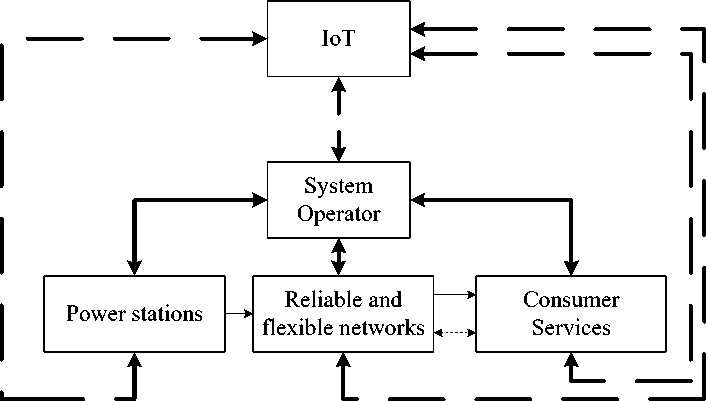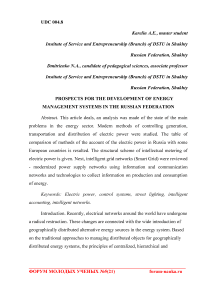Prospects for the development of energy management systems in the Russian Federation
Автор: Karelin A.E., Dmitrienko N.A.
Журнал: Форум молодых ученых @forum-nauka
Статья в выпуске: 5-1 (21), 2018 года.
Бесплатный доступ
This article deals, an analysis was made of the state of the main problems in the energy sector. Modern methods of controlling generation, transportation and distribution of electric power were studied. The table of comparison of methods of the account of the electric power in Russia with some European countries is resulted. The structural scheme of intellectual metering of electric power is given. Next, intelligent grid networks (Smart Grid) were reviewed - modernized power supply networks using information and communication networks and technologies to collect information on production and consumption of energy.
Electric power, control systems, street lighting, intelligent accounting, intelligent networks
Короткий адрес: https://sciup.org/140282403
IDR: 140282403
Текст научной статьи Prospects for the development of energy management systems in the Russian Federation
Introduction. Recently, electrical networks around the world have undergone a radical restruction. These changes are connected with the wide introduction of geographically distributed alternative energy sources in the energy system. Based on the traditional approaches to managing distributed objects for geographically distributed energy systems, the principles of centralized, hierarchical and distributed control can be applied. The most effective of them is the use of intelligent control systems.
In Russian Federation and abroad a lot of specialists are working at the development of concepts of intelligent network technologies. Prospects for their development in Russian Federation can be formulated as follows:
-
- development of renewable energy sources;
-
- development of distributed energy;
-
- reduction of power losses due to the construction of intelligent
metering systems, taking into account the quality of electricity and limiting the load;
-
- development of the communication environment, providing
information exchange between energy suppliers and consumers;
-
- use of intelligent equipment and software to ensure the reliability of
the work;
-
- Use of high-performance energy storage devices to equalize the load
graph.
Intelligent energy networks
Intelligent networks are specific application of intelligent energy systems that, with information technology, correct the flow of electricity between suppliers and consumers. Intelligent networks contribute to the generation, distribution and consumption of electricity. The electrical system becomes prognostic, communicative and controlled. The goal is to make intelligent networks flexible and able to accurately interact with the behavior and actions of all connected users. Recently, an advanced measurement infrastructure has been widely implemented abroad (AMI). It allows measuring energy consumption in detail at a higher frequency. This results in a large volume of smart meter data that shows more information about consumer behavior and displays them on the site. It allows the information system to introduce various price rates for electricity consumption depending on the time of day and season. An intelligent information system collects and transmits information to system components, such as service providers and customers. For example, consumers can benefit from information provided by the system to rationally use electricity, and lower tariffs. Figure 1 shows a comparison of the current power supply system and the intelligent system. One of the main problems of intelligent accounting is the extraction of useful information from a large amount of data (from households, office buildings). The solution to this problem is Big Data technologies that include powerful sets of algorithms. It facilitates the analysis, interpretation and detection of hidden structures in data of an intellectual dimension.

Energy flows
----► Now
-----> Will be
Information flows
------> Now
--> Will be
Figure 1 - Comparison of the current power supply system and Smart Grid
Using an intelligent energy system will eliminate all current problems;
ensure positive effects for all subjects of the retail market. Table 2 presents foreign projects for the intelligent metering of electricity.
Table 2 - Foreign projects for the intelligent metering of electricity
|
Name of the project |
Technology |
Start |
|
ERDF (France) |
GPRS, PLC |
2012 |
|
Silicon Valley Power (USA) |
PLC, Radio |
2014 |
|
The Salt River Project (USA) |
PLC, 3G |
2013 |
|
EDF Energy (Great Britain) |
PLC, 3G |
2015 |
|
E.ON (Great Britain) |
PLC |
2016 |
|
Rwe npower (Great Britain) |
PLC |
2016 |
|
Ernst & Young (Germany) |
PLC, 3G |
2013 |
|
Alliander (Netherlands) |
PLC, Radio |
2013 |
|
Vattenfall (Sweden) |
PLC, Radio |
2014 |
Using Smart Grid technology is effective in the following tasks:
-
- intelligent systems for monitoring, integrating and managing renewable energy sources;
-
- distributed devices for the production and storage of energy based on methods of artificial intelligence;
-
- intelligent systems focused on monitoring and managing electricity parameters by consumers;
-
- management of electricity consumption;
-
- load monitoring under extreme conditions;
-
- automated transmission, processing and provision of information on energy consumption;
-
- formation of situational databases on energy consumption;
The conclusion. Based on the analysis, we can conclude that the use of intelligent power supply networks can achieve the following effects:
-
- reduction of technological and minimization of commercial losses;
-
- reduction of consumer spending and receipt of additional income;
-
- new markets, industries, jobs;
-
- increase in energy efficiency;
-
- growth in the environmental friendliness of energy;
-
- cyber-physical security;
Список литературы Prospects for the development of energy management systems in the Russian Federation
- Kosenko E. Yu. System aspects of the optimization of the functioning of geographically distributed energy systems / Izvestiya SFU. Technical science. - 2012. - No. 2 (127). - P. 232-236.
- Chernichkin M. Yu. The Big Encyclopedia of the Electrician / M. Yu. Chernichkin.- M.: Eksmo, 2011. - 272 p.
- Methods of analysis and justification of solutions to improve reliability and safety in the energy sector. System research in the energy sector under the new socio-economic conditions / N. I. Voropai [et al.]. - Н.: Science, 2005. - 125 p.
- Merkuriev GV Operational-dispatching management of power systems / GV Merkuriev. - St. Petersburg: Eksmo, 2012. - 116 p.
- Ametistova E.V. Fundamentals of modern energy / EV Ametistova. - M.: Publishing house MEI, 2008. - 162 p.


